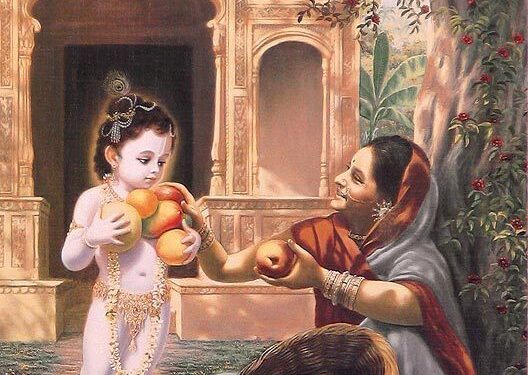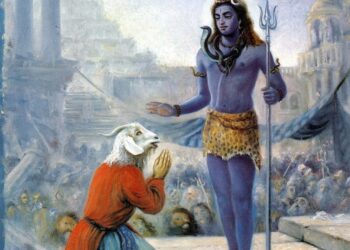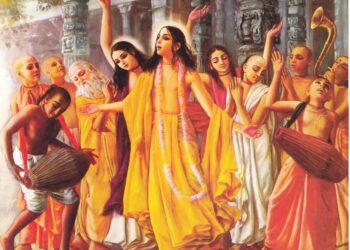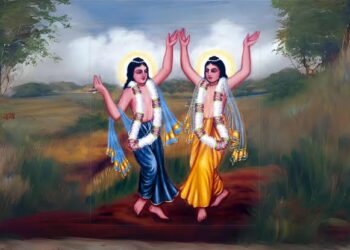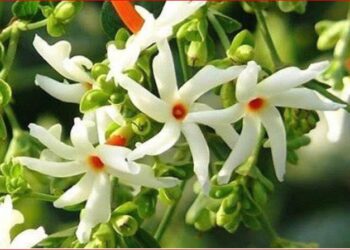As a great devotee of Kṛṣṇa, King Parīkṣit was already liberated, but for clarification he was asking various questions of Śukadeva Gosvāmī. In the previous chapter, King Parīkṣit’s question was, “What is the ultimate goal of the Vedas?” And Śukadeva Gosvāmī explained the matter, giving authoritative descriptions from the disciplic succession, from Sanandana down to Nārāyaṇa Ṛṣi, Nārada, Vyāsadeva and then Śukadeva himself. The conclusion was that devotional service, or bhakti, is the ultimate goal of the Vedas. A neophyte devotee may question, “If the ultimate goal of life, or the conclusion of the Vedas, is to elevate oneself to the platform of devotional service, then why is it observed that a devotee of Lord Viṣṇu is generally not very prosperous materially, whereas a devotee of Lord Śiva is found to be very opulent?” In order to clarify this matter, Parīkṣit Mahārāja asked Śukadeva Gosvāmī, “My dear Śukadeva Gosvāmī, it is generally found that those who engage in the worship of Lord Śiva, whether in human, demoniac or demigod society, become materially very opulent, although Lord Śiva himself lives just like a poverty-stricken person. On the other hand, the devotees of Lord Viṣṇu, who is the controller of the goddess of fortune, do not appear very prosperous, and sometimes they are even found living without any material opulence at all. Lord Śiva lives underneath a tree or in the snow of the Himalayan Mountains. He does not even construct a house for himself, but still the worshipers of Lord Śiva are very rich. Kṛṣṇa, or Lord Viṣṇu, however, lives very opulently, whether in Vaikuṇṭha or in the material world, but His devotees appear poverty-stricken. Why is this so?”
Mahārāja Parīkṣit’s question is very intelligent. The two classes of devotees, namely the devotees of Lord Śiva and the devotees of Lord Viṣṇu, are always in disagreement. Even today in India these two classes of devotees still criticize each other, and especially in South India the followers of Rāmānujācārya and the followers of Śaṅkarācārya hold occasional meetings for understanding the Vedic conclusion. Generally, the followers of Rāmānujācārya come out victorious in such meetings. So Parīkṣit Mahārāja wanted to clarify the situation by asking this question of Śukadeva Gosvāmī. That Lord Śiva lives as a poor man although his devotees appear very opulent, whereas Lord Kṛṣṇa, or Lord Viṣṇu, is always opulent and yet His devotees appear poverty-stricken, is a situation which appears contradictory and puzzling to a discriminating person.
Replying to King Parīkṣit’s inquiry, Śukadeva Gosvāmī said that Lord Śiva is the master of the material energy. The material energy is represented by goddess Durgā, and because Lord Śiva happens to be her husband, goddess Durgā is completely under his subjugation. Thus Lord Śiva is understood to be the master of this material energy. The material energy is manifested in three qualities, namely goodness, passion and ignorance, and therefore Lord Śiva is the master of these three qualities. Although he is in association with these qualities for the benefit of the conditioned soul, Lord Śiva is their director and is not affected. In other words, although the conditioned soul is affected by the three qualities, Lord Śiva, being their master, is not.
From the statements of Śukadeva Gosvāmī we can understand that the effects of worshiping different demigods are not, as some less intelligent persons suppose, the same as the effects of worshiping Lord Viṣṇu. Śukadeva Gosvāmī clearly states that by worshiping Lord Śiva one achieves one reward whereas by worshiping Lord Viṣṇu one achieves a different reward. This is confirmed in the Bhagavad-gītā: “Those who worship the different demigods achieve the desired results the respective demigods can reward. Similarly, those who worship the material energy receive the suitable reward for such activities, and those who worship the pitṛs receive similar results. But those who engage in devotional service or worship the Supreme Lord—Viṣṇu, or Kṛṣṇa—go to the Vaikuṇṭha planets or Kṛṣṇaloka.” One cannot approach the transcendental region, or paravyoma, the spiritual sky, by worshiping Lord Śiva or Brahmā or any other demigod.
Since this material world is a product of the three qualities of material nature, all varieties of manifestations come from those three qualities. With the aid of materialistic science, modern civilization has created many machines and comforts, yet they are only varieties of the interactions of the three material qualities. Although the devotees of Lord Śiva are able to obtain many material acquisitions, we should know that such devotees are simply collecting products manufactured by the three qualities. The three qualities are again subdivided into sixteen, namely the ten senses (five working senses and five knowledge-acquiring senses), the mind, and the five elements (earth, water, air, fire and sky). These sixteen items are extensions of the three qualities. Material happiness or opulence means gratification of the senses, especially the genitals, the tongue and the mind. By exercising our minds we create many pleasurable things just for enjoyment by the genitals and the tongue. The opulence of a person within this material world is estimated in terms of his exercise of the genitals and the tongue, or, in other words, how well he is able to utilize his sexual capacities and how well he is able to satisfy his fastidious taste by eating palatable dishes. Material advancement of civilization necessitates creating objects of enjoyment by mental concoction just to become happy on the basis of these two principles: pleasures for the genitals and pleasures for the tongue. Herein lies the answer to King Parīkṣit’s question to Śukadeva Gosvāmī as to why the worshipers of Lord Śiva are so opulent.
The devotees of Lord Śiva are opulent only in terms of the material qualities. Factually, such so-called advancement of civilization is the cause of entanglement in material existence. It is actually not advancement but degradation. The conclusion is that because Lord Śiva is the master of the three qualities, his devotees are given things manufactured by the interactions of these qualities for the satisfaction of the senses. In the Bhagavad-gītā, however, we get instruction from Lord Kṛṣṇa that one has to transcend this qualitative existence. Nistrai-guṇyo bhavārjuna: the mission of human life is to become transcendental to the three qualities. Unless one is nistrai-guṇya, he cannot get free from material entanglement. In other words, favors received from Lord Śiva are not actually beneficial to the conditioned souls, although materially such facilities seem opulent.
Śukadeva Gosvāmī continued: “The Supreme Personality of Godhead, Hari, is transcendental to the three qualities of material nature.” In the Bhagavad-gītā the Lord states that anyone who surrenders unto Him surpasses the control of the three qualities of material nature. Therefore, since Hari’s devotees are transcendental to the control of the three material qualities, certainly He Himself is transcendental. In Śrīmad-Bhāgavatam it is therefore stated that Hari, or Kṛṣṇa, is the original Supreme Personality. There are two kinds of prakṛtis, or potencies, namely the internal potency and the external potency, and Kṛṣṇa is the overlord of both. He is sarva-dṛk, or the overseer of all the actions of the internal and external potencies, and He is also described as upadraṣṭā, the supreme advisor. Because He is the supreme advisor, He is above all the demigods, who merely follow the directions of the supreme advisor. As such, if one directly follows the instructions of the Supreme Lord, as inculcated in the Bhagavad-gītā and Śrīmad-Bhāgavatam, then one gradually becomes nirguṇa, or above the interactions of the material qualities. To be nirguṇa means to be bereft of material opulences because, as we have explained, material opulence means an increase of the actions and reactions of the three material qualities. By worshiping the Supreme Personality of Godhead, instead of being puffed up with material opulences one becomes enriched with spiritual advancement of knowledge in Kṛṣṇa consciousness. To become nirguṇa means to achieve eternal peace, fearlessness, religiousness, knowledge and renunciation. All these are symptoms of becoming free from the contamination of the material qualities.
Śukadeva Gosvāmī, in answering Parīkṣit Mahārāja’s question, went on to cite a historical instance regarding Parīkṣit Mahārāja’s grandfather, King Yudhiṣṭhira. He said that after finishing the Aśvamedha sacrifice in the great sacrificial arena, King Yudhiṣṭhira, in the presence of great authorities, inquired from Lord Kṛṣṇa on that very same point: how is it that the devotees of Lord Śiva become materially opulent, whereas the devotees of Lord Viṣṇu do not? Śukadeva Gosvāmī specifically referred to King Yudhiṣṭhira as “your grandfather” so that Mahārāja Parīkṣit would be encouraged to think that he was related to Kṛṣṇa and that his grandfathers were intimately connected with the Supreme Personality of Godhead.
Although Kṛṣṇa is always very satisfied by nature, when Mahārāja Yudhiṣṭhira asked this question the Lord became even more satisfied because this question and its answer would bear a great meaning for the entire Kṛṣṇa conscious society. Whenever Lord Kṛṣṇa speaks about something to a specific devotee, it is meant not only for that devotee but for all devotees, and indeed for the entire human society. Instructions by the Supreme Personality of Godhead are important even to Lord Brahmā, Lord Śiva and the other demigods, and if one does not take advantage of the instructions of the Supreme Personality of Godhead, who descends within this world for the benefit of all living entities, he is certainly very unfortunate.
Lord Kṛṣṇa answered the question of Mahārāja Yudhiṣṭhira as follows: “If I especially favor a devotee and especially wish to care for him, the first thing I do is take away his riches. When the devotee becomes a penniless pauper or is put into a comparatively poverty-stricken position, his relatives and family members no longer take interest in him, and in most cases they give up their connection with him. The devotee then becomes doubly unhappy.” First of all the devotee becomes unhappy because his riches have been taken away by Kṛṣṇa, and he is made even more unhappy when his relatives desert him because of his poverty. We should note, however, that when a devotee falls into a miserable condition in this way, it is not due to past impious activities, known as karma-phala; the poverty of the devotee is a creation of the Personality of Godhead. Similarly, when a devotee becomes materially opulent, that is also not due to his pious activities. In either case, whether the devotee becomes poorer or richer, the arrangement is made by the Supreme Personality of Godhead. This arrangement is especially made by Kṛṣṇa for His devotee just to make him completely dependent upon Him and to free him from all material obligations. He can then concentrate his energies, mind and body—everything—for the service of the Lord, and that is pure devotional service. In the Nārada-pañcarātra it is therefore explained, sarvopādhi-vinirmuktam [Cc. Madhya 19.170], which means “being freed from all designations.” Works performed for family, society, community, nation or humanity are all designated: “I belong to this society,” “I belong to this community,” “I belong to this nation,” “I belong to this species of life.” Such identities are all merely designations. When by the grace of the Lord a devotee is freed from all designations, his devotional service is actually naiṣkarmya. Jñānīs are very much attracted by the position of naiṣkarmya, in which one’s activities no longer have any material effect. The devotee’s activities are freed from material effects, and so they are no longer in the category of karma-phalam, or fruitive activities. As explained before by the personified Vedas, the happiness and distress of a devotee are produced by the Personality of Godhead, and the devotee therefore does not care whether he is in happiness or in distress. He goes on with his duties in executing devotional service. Although his behavior seems to be subject to the actions and reactions of fruitive activities, he is actually freed from the results of action.
It may be questioned why a devotee is put into such tribulation by the Personality of Godhead. The answer is that this kind of arrangement by the Lord is just like a father’s sometimes becoming unkind to his sons. Because the devotee is a surrendered soul and is taken charge of by the Supreme Lord, whatever condition of life the Lord puts him in—whether one of distress or of happiness—it is to be understood that behind this arrangement is a large plan designed by the Personality of Godhead. For example, Lord Kṛṣṇa put the Pāṇḍavas into a distressed condition so acute that even grandfather Bhīṣma could not comprehend how such distress could occur. He lamented that although the whole Pāṇḍava family was headed by King Yudhiṣṭhira, the most pious king, and protected by the two great warriors Bhīma and Arjuna, and although, above all, the Pāṇḍavas were all intimate friends and relatives of Lord Kṛṣṇa, they still had to undergo such tribulations. Later, however, it was proved that this was planned by the Supreme Personality of Godhead, Kṛṣṇa, as part of His great mission to annihilate the miscreants and protect the devotees.
Another question may be raised: What is the difference between a devotee and a common man, since both are put into different kinds of happy and distressful conditions—the devotee by the arrangement of the Personality of Godhead, and the common man as a result of his past deeds? How is the devotee any better than the ordinary karmī ? The answer is that the karmīs and the devotees are not on the same level. In whatever condition of life the karmī may be, he continues in the cycle of birth and death because the seed of karma, or fruitive activity, is there, and it fructifies whenever there is an opportunity. By the law of karma a common man is perpetually entangled in repeated birth and death, whereas a devotee’s distress and happiness, not being under the laws of karma, are part of a temporary arrangement by the Supreme Lord which does not entangle the devotee. Such an arrangement is made by the Lord only to serve a temporary purpose. If a karmī performs auspicious acts he is elevated to the heavenly planets, and if he acts impiously he is put into a hellish condition. But whether a devotee acts in a so-called pious or impious manner, he is neither elevated nor degraded, but is transferred to the spiritual kingdom. Therefore a devotee’s happiness and distress and a karmī’s happiness and distress are not on the same level. This fact is corroborated by a speech by Yamarāja to his servants in connection with the liberation of Ajāmila. Yamarāja advised his followers that only persons who have never uttered the holy name of the Lord or remembered the form, qualities and pastimes of the Lord should be approached by his watchguards. Yamarāja also advised his servants never to approach the devotees. On the contrary, he instructed his messengers that if they meet a devotee they should offer their respectful obeisances. So there is no question of a devotee’s being promoted or degraded within this material world. As there is a gulf of difference between the punishment awarded by the mother and the punishment awarded by an enemy, so a devotee’s distress is not the same as the distress of a common karmī.
Here another question may be raised: If the Supreme Lord is all-powerful, why should He try to reform His devotee by putting him in distress? The answer is that when the Supreme Personality of Godhead puts His devotee in distress, it is not without purpose. Sometimes the purpose is that in distress a devotee’s feelings of attachment to Kṛṣṇa are magnified. For example, when Kṛṣṇa, before leaving the capital of the Pāṇḍavas for His home, asked Kuntīdevī for permission to leave, she said, “My dear Kṛṣṇa, in our distress You were always present with us. Now, because we have been elevated to a royal position, You are leaving us. I would therefore prefer to live in distress than to lose You.” When a devotee is put into a situation of distress, his devotional activities are accelerated. Therefore, to show special favor to a devotee, the Lord sometimes puts him into distress. Besides that, it is stated that the sweetness of happiness is sweeter to those who have tasted bitterness. The Supreme Lord descends to this material world just to protect His devotees from distress. In other words, if devotees were not in a distressed condition, the Lord would not have come down. As for His killing the demons, or miscreants, this can be easily done by His various energies, just as many asuras are killed by His external energy, goddess Durgā. Therefore the Lord does not need to come down personally to kill such demons, but when His devotee is in distress He must come. Lord Nṛsiṁhadeva appeared not in order to kill Hiraṇyakaśipu but to save Prahlāda and to give him blessings. In other words, because Prahlāda Mahārāja was put into very great distress, the Lord appeared.
When after the dense, dark night there is finally sunrise in the morning, it is very pleasant; when there is scorching heat, cold water is very pleasant; and when there is freezing winter, hot water is very pleasant. Similarly, when a devotee, after experiencing the distress of the material world, relishes the spiritual happiness awarded by the Lord, his position is still more pleasant and enjoyable.
The Lord continued: “When My devotee is bereft of all material riches and is deserted by his relatives, friends and family members, because he has no one to look after him he completely takes shelter of the lotus feet of the Lord.” Śrīla Narottama dāsa Ṭhākura has sung in this connection, “My dear Lord Kṛṣṇa, O son of Nanda Mahārāja, You are now standing before me with Śrīmatī Rādhārāṇī, the daughter of King Vṛṣabhānu. I am now surrendering unto You. Please accept me. Please do not kick me away. I have no shelter other than You.”
When a devotee is thus put into so-called miserable conditions and bereft of riches and family, he tries to revive his original position of material opulence. But although he tries again and again, Kṛṣṇa again and again takes away all his resources. Thus he finally becomes disappointed in material activities, and in that stage of frustration in all endeavors, he can fully surrender unto the Supreme Personality of Godhead. Such persons are advised by the Lord from within to associate with devotees. By associating with devotees they naturally become inclined to render service to the Personality of Godhead, and they immediately get all facilities from the Lord to advance in Kṛṣṇa consciousness. The nondevotees, however, are very careful about preserving their material condition of life. Generally, therefore, such nondevotees do not come to worship the Supreme Personality of Godhead, but worship Lord Śiva or other demigods for immediate material profit. In the Bhagavad-gītā it is said, therefore, kāṅkṣantaḥ karmaṇāṁ siddhiṁ yajanta iha devatāḥ: “The karmīs, in order to achieve success within this material world, worship the various demigods.” It is also stated by Lord Kṛṣṇa that those who worship the demigods are not mature in their intelligence. The devotees of the Supreme Personality of Godhead, therefore, because of their strong attachment for Him, do not foolishly go to the demigods.
Lord Kṛṣṇa said to King Yudhiṣṭhira, “My devotee is not deterred by any adverse conditions of life; he always remains firm and steady. Therefore I give Myself to him, and I favor him so that he can achieve the highest success of life.” The mercy bestowed upon the tried devotee by the Supreme Personality is described as brahma, which indicates that the greatness of that mercy can be compared only to the all-pervasive greatness of Brahman. Brahma means unlimitedly great and unlimitedly expanding. That mercy is also described as paramam, for it has no comparison within this material world, and it is also called sūkṣmam, very fine. Not only is the Lord’s mercy upon the tried devotee great and unlimitedly expansive, but it is of the finest quality of transcendental love between the devotee and the Lord. Such mercy is further described as cin-mātram, completely spiritual. The use of the word mātram indicates absolute spirituality, with no tinge of material qualities. That mercy is also called sat (eternal) and anantakam (unlimited). Since the devotee of the Lord is awarded such unlimited spiritual benefit, why should he worship the demigods? A devotee of Kṛṣṇa does not worship Lord Śiva or Brahmā or any other, subordinate demigod. He completely devotes himself to the transcendental loving service of the Supreme Personality of Godhead.
Śukadeva Gosvāmī continued: “The demigods, headed by Lord Brahmā and Lord Śiva and including Lord Indra, Candra, Varuṇa and others, are apt to be very quickly satisfied or very quickly angered by the good or ill behavior of their devotees. But this is not so with the Supreme Personality of Godhead, Viṣṇu.” This means that every living entity within this material world, including the demigods, is conducted by the three modes of material nature, and therefore the qualities of ignorance and passion are very prominent within the material world. Those devotees who take blessings from the demigods are also infected with the material qualities, especially passion and ignorance. Lord Śrī Kṛṣṇa has therefore stated in the Bhagavad-gītā that to take blessings from the demigods is less intelligent because when one takes benedictions from the demigods the results of such benedictions are temporary. It is easy to get material opulence by worshiping the demigods, but the result is sometimes disastrous. As such, the benedictions derived from demigods are appreciated only by the less intelligent class of men. Persons who derive benedictions from the demigods gradually become puffed up with material opulence and neglectful of their benefactors.
Śukadeva Gosvāmī addressed King Parīkṣit thus: “My dear King, Lord Brahmā, Lord Viṣṇu and Lord Śiva, the principal trio of the material creation, are able to bless or curse anyone. Of this trio, Lord Brahmā and Lord Śiva are very easily satisfied but also very easily angered. When satisfied they give benedictions without consideration, and when angry they curse the devotee without consideration. But Lord Viṣṇu is not like that. Lord Viṣṇu is very considerate. Whenever a devotee wants something from Lord Viṣṇu, Lord Viṣṇu first considers whether such a benediction will ultimately be good for the devotee. Lord Viṣṇu never bestows any benediction which will ultimately prove disastrous to the devotee. By His transcendental nature, He is always merciful; therefore, before giving any benediction, He considers whether it will prove beneficial for the devotee. Since the Supreme Personality of Godhead is always merciful, even when it appears that He has killed a demon, or even when He apparently becomes angry toward a devotee, His actions are always auspicious. The Supreme Personality of Godhead is therefore known as all-good. Whatever He does is good.”










